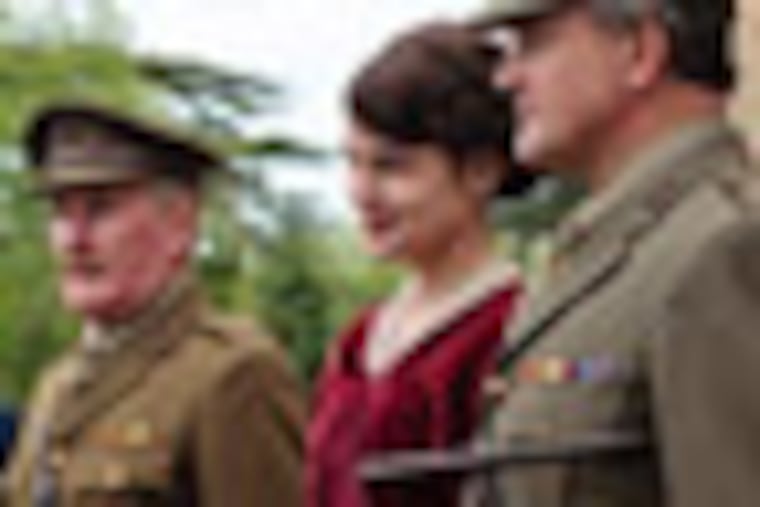'Downton Abbey' capturing the fancy of younger viewers
Set on a lavishly appointed estate just as England is on the brink of unimaginable change (automobiles, telephones, and a war that will shatter class distinctions), the mini-series Downton Abbey is itself bringing extraordinary change to public television.

Set on a lavishly appointed estate just as England is on the brink of unimaginable change (automobiles, telephones, and a war that will shatter class distinctions), the mini-series Downton Abbey is itself bringing extraordinary change to public television.
It is attracting younger viewers - and that's almost as significant as winning the Golden Globe for best mini-series this month.
"There's no question we're hitting a new crowd," says senior producer Steven Ashley.
Downton's first season, which ended in November, doubled the Masterpiece Theater audience in the 25-to-49 age group without turning off any seasoned viewers.
More than four million tuned in Jan. 8 for the start of Season 2.
Like the Girl Scouts, who pride themselves on the motto "Make new friends and keep the old," Downton "rewards longtime supporters and brings in new ones," says executive producer Rebecca Eaton.
Nielsen surveys are one measure, but there are other clues that both old and young are watching Downton Abbey:
Older viewers talk of organizing their week around watching it, while younger ones stream the show online in numbers never before seen by PBS, Ashley says.
On Facebook, fans show their ages by using words like addictive and obsessed.
Tweets such as "My Econ prof just mentioned Downton Abbey" and "It's the classy crack" are likely signs of a younger audience, too.
When the Golden Globe was announced Jan. 15, Downton garnered an average 6,162 tweets per second, outpacing the Super Bowl and the royal wedding.
Speaking of royals, Jessica Brown-Findlay, who plays Lady Sybil, the youngest daughter of Downton Abbey's Lord Grantham, reportedly let on that Will and Kate (the actual Duke and Duchess of Cambridge) told her they watch the show and love it.
"What's not to love?" Eaton asks. "The costumes, the jewelry, the production values?"
Vintage clothes shops are reporting an uptick in demand for Edwardian styles. Book publishers are using the show's hashtags (#downtonabbey and #downtonpbs) to point readers toward titles such as What the Butler Winked at by Eric Horne and Rose: My Life in Service to Lady Astor by Rosina Harrison.
And at Highclere Castle, the real-life estate where Downton is filmed, they are simply beside themselves.
Highclere has been home to the Carnarvon family since 1679, you know. And the Fifth Countess of Carnarvon did indeed let the manor be used as a hospital in September 1914. The estate is closed to tours until April, but you can read all about it in Lady Almina and the Real Downton Abbey (Random House, December 2011).
As it happens, Downton creator and writer Julian Fellowes, himself a lord, is a longtime friend of the Carnarvons besides being an esteemed writer. (He won the 2002 Oscar for his screenplay for another great costume drama, Gosford Park.)
Robert Thompson, Syracuse University's resident pop-culture expert, calls Downton "a delicious soap opera" with a plot that "brings class warfare and Occupy to mind."
"You can't watch without that humming in the background," Thompson says.
Picture it: April 1912. The Titanic sinks, taking with it the fiance of Lady Mary Crawley. Now left with no male heir (even by marriage) to inherit Downton Abbey, Mary's father can only hope she will fall in love with Matthew Crawley, third cousin once removed, who is suddenly in line to inherit the 500-room estate.
Not that she's met him yet, but "Mary must marry Matthew," crows the dowager countess, played by the legendary Maggie Smith.
Like all great love stories, Mary and Matthew's has obstacles aplenty, and their high-stakes romance is the engine that drives the series' narrative.
Don't expect all soap opera, though; there's a serious undertow.
"There's trouble brewing, and lives are on the edge of danger or change or heartbreak or death," Eaton says.
In the dust of World War I, a new middle class will emerge, and Downton, at least as these characters know it, will not be the same.
The people of Downton Abbey, aristocrats and servants alike, Eaton says, "are trying to do the right thing by each other and in their own mind."
As with any PBS program, watching is its own reward.
"You get to feel virtuous about watching PBS, especially if you've watched from the start," Thompson says. "It's like being able to say you watched Monty Python since the beginning or Saturday Night Live since Laraine Newman.
"In the end, though," Thompson says, "it's popular because it's a great story."